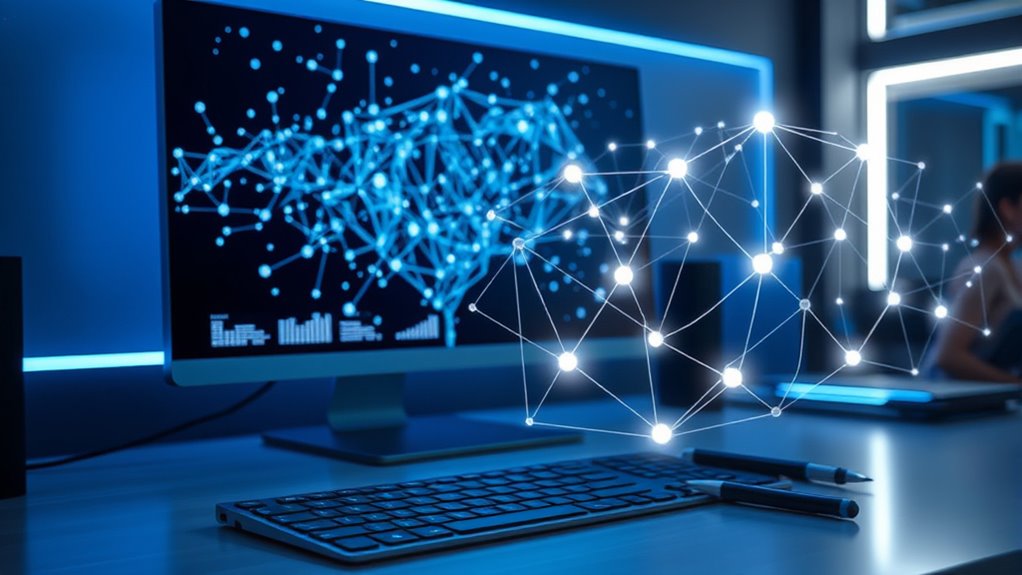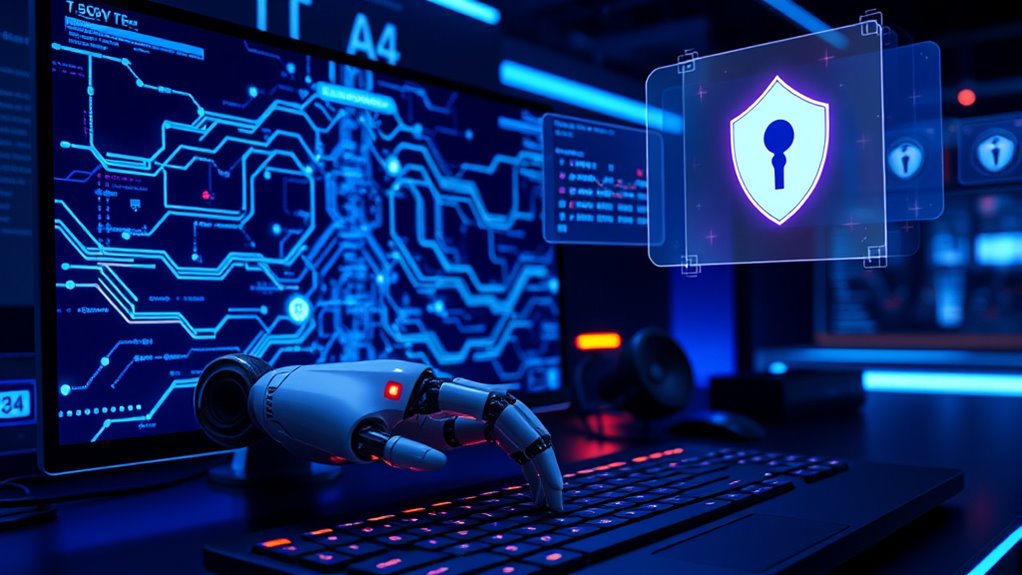AI enhances blockchain security by continuously monitoring transactions for suspicious activity and using advanced algorithms to detect anomalies instantly. It adapts to new threats through machine learning, predicting potential risks before harm occurs. Additionally, AI streamlines identity verification with biometric checks, reduces smart contract vulnerabilities, and analyzes transaction patterns for illicit behavior. This proactive approach helps keep your blockchain more secure and trustworthy. Keep exploring to discover more ways AI can elevate your blockchain’s safety.
Key Takeaways
- AI continuously monitors blockchain activities to detect and prevent suspicious transactions in real-time.
- Machine learning models adapt to emerging fraud tactics, enhancing predictive threat detection.
- AI streamlines identity verification and user authentication, ensuring secure access and compliance.
- Automated tools scan smart contracts for vulnerabilities, reducing human error and preventing exploitation.
- Behavioral AI analyzes transaction patterns to identify illicit activities like money laundering instantly.

Have you ever wondered how artificial intelligence is transforming blockchain security? It’s revolutionizing the way transactions are monitored, verified, and protected. AI continuously scans blockchain activities through real-time monitoring, spotting unusual patterns or anomalies instantly. This ongoing vigilance allows you to catch suspicious transactions as they happen, rather than after damage is done. Advanced anomaly detection algorithms analyze vast amounts of data, pinpointing irregularities in trade patterns or wallet behaviors that could indicate fraudulent activity. This proactive approach helps prevent scams before they escalate. Additionally, implementing security best practices can further strengthen your defenses against emerging threats.
Machine learning models play an essential role by adapting to new fraud tactics. As cybercriminals develop new methods, AI systems learn and evolve, guaranteeing your blockchain remains protected against emerging threats. They’re not just reactive but predictive, using historical data to forecast potential fraud risks. This allows you to implement preventive measures, strengthening your security posture before issues arise. AI’s capabilities extend further into safeguarding decentralized systems, where it maintains integrity by identifying and deterring malicious actors trying to compromise the platform. Furthermore, AI can analyze blockchain transaction patterns to identify subtle signs of coordinated attacks or insider threats that might go unnoticed through manual review. This adaptive learning capability is crucial for maintaining a resilient security infrastructure. Incorporating behavioral analysis enhances the detection of sophisticated fraud schemes that traditional methods might miss.
When it comes to identity verification, AI streamlines and secures the process. Decentralized identity verification tools cross-check user data against global databases, making sure identities are genuine. Biometric authentication methods like facial recognition and fingerprint scans add an extra layer of security, reducing the risk of identity theft. AI also detects synthetic identities created using deepfake technology, helping you comply with Know Your Customer (KYC) regulations more effectively. These systems verify identities quickly and reliably, ensuring that only legitimate users access the network.
Smart contract security benefits profoundly from AI as well. Automated auditing tools scan contracts for vulnerabilities, catching exploitable flaws before they can be exploited. AI analyzes potential threats through predictive analysis, identifying weak points in smart contracts before any attack occurs. Continuous, real-time monitoring ensures that any suspicious activity is flagged immediately, allowing for rapid intervention. By automating these processes, AI reduces human error and increases efficiency, making your smart contracts more secure and reliable.
AI also enhances transparency by analyzing transaction records and identifying suspicious activities. Graph-based analysis helps distinguish between normal trading and laundering efforts, providing clearer insights into blockchain operations. Since blockchain’s ledger is immutable, AI can securely verify every transaction, offering real-time oversight. Predictive analytics further help you assess risks based on historical trends, enabling you to stay ahead of potential threats. Platforms like SentinelOne leverage behavioral AI for traffic analysis, detecting malicious communications instantly. Employing AI-driven security analytics allows for more comprehensive threat detection and response.
In essence, AI’s integration into blockchain security creates a dynamic, adaptable shield that protects your transactions from fraud, theft, and malicious attacks. It not only detects threats faster but also anticipates them, empowering you to maintain a secure, transparent, and trustworthy blockchain environment.
Frequently Asked Questions
How Does AI Detect New Types of Blockchain Fraud?
You want to understand how AI detects new blockchain fraud types. AI systems analyze transaction patterns and relationships, learning from vast data to identify anomalies. They use both supervised and unsupervised methods to spot emerging fraud schemes, even without prior examples. Continual updates and retraining help AI adapt to evolving tactics, ensuring it stays effective at catching novel or sophisticated fraudulent activities in real time.
Can AI Predict Future Blockchain Security Vulnerabilities?
You can leverage AI to predict future blockchain security vulnerabilities by analyzing historical data and identifying patterns that indicate potential risks. AI uses machine learning models to forecast where weaknesses might emerge, allowing you to address them proactively. By continuously monitoring transaction behaviors and smart contract activities, AI helps you stay ahead of threats, reducing the chances of breaches and strengthening your overall blockchain security posture.
What Are the Limitations of AI in Blockchain Security?
You should know that AI faces several limitations in blockchain security. It struggles with data privacy, as gathering enough transactional data risks exposing sensitive info. Scalability is another issue, since AI adds delays and consumes energy, slowing down transactions. Vulnerabilities also exist, like AI’s susceptibility to attacks or false positives. Plus, managing identity and access becomes tricky, especially with evolving threats and complex systems. All these factors limit AI’s effectiveness in securing blockchain networks.
How Is AI Integrated Into Existing Blockchain Infrastructure?
Imagine AI as the vigilant guardian standing at the gate of blockchain infrastructure. You integrate AI by embedding it into your system, enabling it to analyze transaction patterns, automate smart contracts, and monitor network health. You leverage federated learning for privacy, use zero-knowledge proofs to hide sensitive data, and scale computing power to handle complex tasks. This dynamic fusion makes your blockchain smarter, faster, and more secure against evolving threats.
What Ethical Concerns Arise From Using AI in Blockchain Security?
You should be aware that using AI in blockchain security raises ethical concerns like inheriting biases from training data, which can lead to unfair outcomes. Privacy is also a big issue, as sensitive user data might be exposed if not protected properly. Additionally, ensuring transparency and accountability in AI decisions is essential to prevent misuse or errors. Regular audits and human oversight help mitigate these ethical risks and promote fair, secure blockchain systems.
Conclusion
By integrating AI into blockchain security, you dramatically reduce fraud risks—studies show AI can detect 90% of malicious activities in real time. This means your transactions become more reliable and protected from evolving cyber threats. As you adopt AI-driven security measures, you’re not just safeguarding assets; you’re staying ahead of hackers. Embracing this technology guarantees your blockchain transactions remain secure, efficient, and trustworthy in an increasingly digital world.










